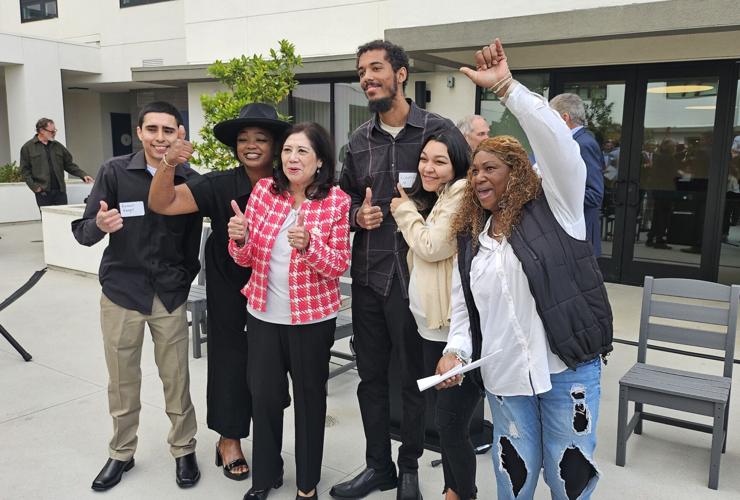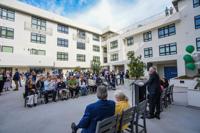
On Friday morning, local elected officials and partners celebrated the grand opening of Brine Residential in Lincoln Heights. This is a 97-unit affordable and permanent supportive housing for adults, transition-aged youth and families who are homeless or at risk of homelessness.
Among the guests were Breanna Cardenas and her boyfriend Robert Miller. For them, this was more than a celebration, as their baby boy will be born on April 8.
“We were building the crib yesterday,” said Miller, expressing the emotion of finally having a place to call home.
Cardenas grew up in foster care and Miller had been in the juvenile system. Personal experiences didn’t allow them to obtain a stable place. This led them to live on the streets for about two years.
“We used to live across the street from Union Station, in a tent,” said Cardenas.
They lived there for about six months until a representative from Los Angeles Homeless Services Authority (LAHSA) offered to help them get off the streets.
They were relocated to the Arroyo Seco Tiny Home Village,, where they lived for about eight months, and at the beginning of this year, they moved into their one-bedroom apartment at the Brine Residential.
Cardenas said the apartment came with furnishings and they were even provided with a crib.
“Here is a different environment and it gives you the stability to be able to build on top of your foundation. It’s a beautiful experience,” said Cardenas.

Out of the 97 units, 72 are Permanent Supportive Housing (PSH), 24 are affordable housing units (60% of Area Median Income) and there is a manager’s unit. The first floor will be commercial space for small businesses, nonprofits or other community-serving enterprises.
The amenities provided to residents
Ramon Rangel, 24, is another new resident at the Brine, entering permanent housing after two years of waiting. Rangel was part of a program with the Department of Mental Health (DMH), and he was offered help for housing.
“I appreciate this every day,” said Rangel.
Tatiana Moncrief, another resident of the Brine, couldn’t hold back her tears when she spoke to the audience, saying she was very proud to have an apartment.
“Growing up in foster care, we don’t have anything,” she said.
Now, in her apartment, she said she is not depressed anymore and she enjoys cleaning it so there are no insects around.
“It’s home here and I never had a home like this,” she added.

The stability of his home has allowed him to work part-time in construction and start building a relationship with his two-year old daughter. He plans to go back to school, taking advantage of services provided at the Brine.
Some of these supportive services include on-site case management, service assessment, money management, transportation support, educational and vocational development
opportunities, independent living skills, response to medical care, substance abuse services and mental health services, among many others.
Los Angeles County Supervisor Hilda Solis said the Brine is the type of project that is much needed because it combines housing with supportive services.
"Here in the First District, we are maximizing community benefits of our public-owned properties located near public transit and other accessible services for our vulnerable residents,” she said.
The project was built by the nonprofit affordable housing developer DECRO Corporation. Its CEO, Ted Handel, said this complex allows individuals and families to rebuild their lives with dignity and opportunity.
"This development strengthens Lincoln Heights by providing stable homes, critical services and commercial space that supports local businesses," he said.
The complex includes common and recreational areas, a community library room, teaching community kitchen, art recreation room, a landscaped central courtyard and a fifth-floor Skydeck. There are also laundry facilities on each floor and secure bicycle parking.
Among the service partners are the Violence Intervention Program (VIP) and The People Concern. Los Angeles County Department of Mental Health (DMH) and Los Angeles County Department of Health Services (DHS), which supports the operational costs.















(0) comments
Welcome to the discussion.
Log In
Keep it Clean. Please avoid obscene, vulgar, lewd, racist or sexually-oriented language.
PLEASE TURN OFF YOUR CAPS LOCK.
Don't Threaten. Threats of harming another person will not be tolerated.
Be Truthful. Don't knowingly lie about anyone or anything.
Be Nice. No racism, sexism or any sort of -ism that is degrading to another person.
Be Proactive. Use the 'Report' link on each comment to let us know of abusive posts.
Share with Us. We'd love to hear eyewitness accounts, the history behind an article.